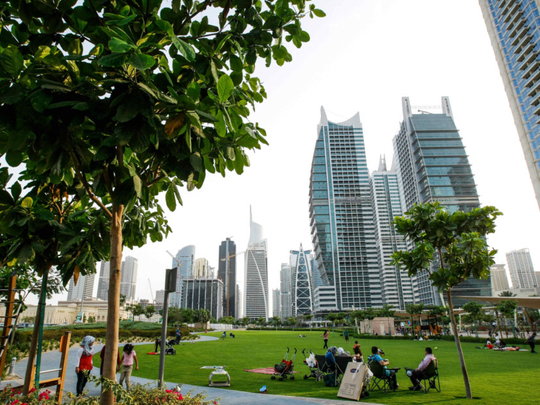
Dubai: All buildings in Dubai will be audited and star-rated in a new building labelling system beginning this year to encourage owners to make them more environment-friendly, officials announced on Tuesday.
The new building labelling system which uses a star-rating will be implemented in all residential, commercial, and industrial buildings in the emirate.
The system falls under the second programme of the Demand Side Management Strategy of the Dubai Supreme Council of Energy (DSCE) on Building Retrofits where old or existing buildings are retrofitted or made more efficient in terms of energy and water use, among others.
The announcement was made during the fourth Retrofit Tech Dubai Summit and Awards.
Ahmad Al Muhairbi, secretary-general of DSCE, said investment in energy efficiency in buildings has been the core undertaking of the DSCE strategy and business plan.
“Building retrofit is of high priority with an outlook to transform the existing building stock of 150,000 buildings in Dubai into greener and more sustainable buildings,” Al Muhairbi said.
“We are moving in the right direction in terms of the number of the projects and in terms of reaching our set targets on the horizon of 2030.”
Dubai aims to reduce 30 per cent of its energy and water use by 2030 or 1.7 terawatt-hour energy savings, 5.6 billion imperial gallons of water savings, one million tonnes of carbon emissions savings, and potential energy reduction in 30,000 buildings out of 120,000.
Al Muhairbi said more than 3,000 buildings are being retrofitted currently, the majority of which are being undertaken by Etihad Esco, a Dubai Electricity and Water Authority (Dewa) venture.
Ali Al Jasem, CEO of Etihad Esco, said it will introduce the star labelling system this year, so building owners can take advantage of the savings they can get by retrofitting their buildings.
“Building owners will ask Etihad to install the building label based on their energy performance: how much electricity and water are being consumed within that facility and then that label will be fixed. The building owner can benefit in terms of financial rewards in that he could sell the building at a higher price compared to a similar building next to him because he has an efficient building. Or he could rent the unit within that building at a higher price,” Al Jasem told Gulf News.
“We need to establish first and then we will roll it out within this year. At this stage, it is voluntary but in a few years, perhaps, it could be mandatory,” he added.
All buildings will be categorised and labelled with a five-star rating for the most efficient buildings and a one-star rating for the poor performers. Owners with low ratings will be given time to improve their standing.
“If they don’t retrofit, they’re losing savings of a minimum of 20 per cent in their utility bills every year, every month,” he said. Etihad Esco focuses on key retrofitting targets including cooling, lighting, water fixture, sustainability, and building envelope that boast of potential savings of 20 to 70 per cent on their electricity and water bill.
For 2016 to 2018 alone, the retrofitted projects Etihad Esco delivered, mainly comprising government buildings, fetched Dh40.1 million in savings and 71.9GWh of energy savings.
Its current projects that are under implementation have a guaranteed savings of Dh60.4 million and 131.45GWh energy savings. Etihad Esco’s current retrofitting projects include many government buildings such as Dubai Police’s 34 facilities, Dubai Healthcare City’s four facilities, Dubai Airports, among others.












